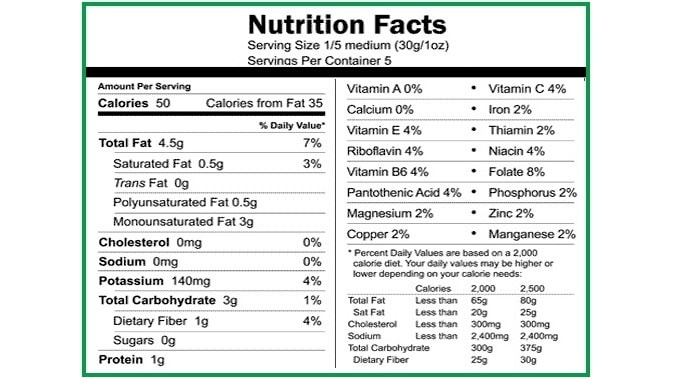The avocado trees are native to Central America and Mexico, and the fatty fruit this tree bears is called avocado or alligator pear often misspelled as ‘avocado.’ The scientific name of the tree is Persea Americana.
People often ask, ‘Is avocado a fruit or vegetable?’. It is 100% fruit.
This fruit is a unique large berry that contains a single seed. It has thick green skin and a fleshy body, often shaped like a pear, egg, or spherical.
Many varieties of avocados in varying shades of green color, size, and shape, but it turns black when fully ripe. The most popular variety of this fruit is called the Hass avocado, which is round with black skin.
Unlike the other fruits, avocado has low carbohydrate content but is rich in healthy monounsaturated fat.
The high-fat content makes this fruit very delicious and gives a creamy texture.
This fruit can be eaten raw and can also be used as guacamole, avocado dip, avocado spread, in sandwiches, burgers, and salads.
Avocado Nutrition
The nutritional value of avocados is unique and better than almost all fruits.
This fruit is rich in vitamins and minerals such as B-Vitamins, Vitamin K, copper, potassium, and Vitamin E, and also it contains a lot of fiber.
About 73% of the fruit is water, 15% fat, 8.5% carbohydrates, and 2% protein.
Below given chart shows the percentage of all the nutrients in avocado per serving (30 grams).

This fruit also has FODMAPs (fermentable oligo-, di-, monosaccharides, and polyols) content that is short-chain carbohydrates not fully digestible.
Because of the FODMAPs in this fruit, some people might experience unpleasant digestive symptoms.
This fruit contains many essential vitamins and minerals, and some of the major ones are as discussed below:
This fruit can supply our body with the Folate (B9 Vitamin) essential for healthy cell functioning and tissue growth.
The blood clotting enabler Vitamin K1 is amply present in avocados. Vitamin K is also essential for the good health of the bones.
The health of the heart and healthy blood pressure control in the body are aided by the mineral potassium; thankfully, avocados contain a healthy amount of potassium.
Another mineral that also contributes to the health of the heart is copper. This trace element is a rare mineral in most vegetables and fruits, but the alligator pears have it in a good amount.
Like all other fatty plant foods, this fruit has a good amount of Vitamin E, a powerful antioxidant essential for good skin and hair health.
The avocado fruit is good for promoting healthy metabolic activities because of Vitamin B6 (Pyridoxine) contained in it.
This fruit is also good for maintaining the good functioning of the immune system and for healthy skin because of the good bit of Vitamin C found in it.
Avocados also contain carotenoids such as zeaxanthin and lutein that help improve eyesight and prevent eye disease that happens with a person’s aging.
D-Mannoheptulose, a type of sugar in this fruit, can manage the blood sugar level well.
This fruit also contains two powerful antioxidants, Persenones A and B. These two antioxidants are particularly beneficial for preventing inflammation and cancer.
Avocado Calories
All weight-conscious people are curious to know how many calories an avocado has.
Half an avocado (68 grams) contains 109 calories, corresponding to 160 per 100 grams.
Avocado calories in 1 cup of this sliced fruit (146 grams/5.1oz) are about 229 calories.
The amount of sugar in this fruit is comparatively much less than that in most other fruits. Only 0.5 grams of sugar is contained in half an avocado (68 grams) in the form of glucose, fructose, and galactose.
The low calories in avocado are mainly because of this fruit’s low sugar and carbohydrate.
This fruit also scores very low on the glycemic index score because of the low sugar content in it. It is safe to consume ‘alligator pear’ without the fear of a rise in blood sugar levels.
Carbs In Avocado
The carbs in avocados are very little in comparison to other fruits. Only 12-gram carbohydrate is present in 1 cup of sliced avocado fruit (146 gram/5.1oz).
The avocado carbs are mostly in the fibrous form that the body won’t absorb in most parts.
As fiber occupies most of the carbohydrate content (79%) of avocados, the net digestible carbs are only 1.8 grams for every 100 grams of this fruit.
One avocado contains about 9 grams of fiber, which is generally very high for fruits.
Avocado Benefits
The avocado fruit is called by many the ‘superfood’ for the several health benefits derived from this fruit.
The benefits of avocado extend from its efficiency in reducing the risk of cardiovascular disease to its effectiveness in controlling body weight.
The powerful antioxidants in this fruit bring added advantages to a person’s good health by preventing deadly diseases like cancer and stroke.
This fruit has very low calories with a high amount of healthy monounsaturated fats and nutrients. For all these reasons, it is common to know about avocados’ several major health benefits.
Below listed are the 12 major health benefits of avocado.
1. Improves Heart Health
When the poor health of the heart has become the major cause of death in the world, there is some solace to this issue to be found in this fruit.
We know how bad blood cholesterol (LDL), high blood pressure, triglycerides, and inflammatory markers are responsible for increasing the risk of heart disease.
Some studies have proven the benefits of avocado in lowering LDL cholesterol and triglycerides in the blood. At the same time, this fruit helps to increase the good HDL cholesterol in the blood.
The healthy monounsaturated fat amply present in this fruit makes it healthy for the heart. The folic acid and Vitamin B6 contributed by this fruit are also beneficial for the health of the heart.
One of the studies published in 2013 in the Nutrition Journal explained the effectiveness of avocados in neutralizing the bad effects of metabolic syndrome. Also, it helps reduce the risk of coronary artery disease, diabetes, and stroke.
2. Weight Loss And Appetite Suppression Aided By Avocado
Despite its high-fat content, this fruit is very low in calories and does NOT contribute to weight gain. Overweight people may not necessarily lose weight with this fruit, but they will not put on extra weight because of it.
One of the direct impacts of this fruit on weight loss is its effectiveness in suppressing appetite. It is found that people who have avocados before or along with the meal attain faster satiation, and the amount of food intake is also reduced.
The high fibrous content in this fruit is also helpful in restricting carbohydrate absorption by the body and reduces the blood sugar level. The metabolic activities also improve because of its good amount of fiber.
3. Helps In Preventing Arthritis
One of the most effective natural supplements used today to fight arthritis is avocado oil (33%) and soybean oil (66%), which suppress the preliminary symptoms that give rise to arthritis.
Many studies have proven that avocado oil contains effective ingredients that can reduce the symptoms of arthritis, especially affecting the joints at the knees and hips.
4. Useful For Regulating Blood Sugar Level
The avocado’s healthy monounsaturated fats and fibrous content help regulate the blood sugar level.
Unlike the other fruits, there is very little sugar and digestible carbohydrate present in the fruit; this is ideal for preventing the rise in blood sugar levels.
5. Avocado Is An Anti-Inflammatory Agent
This fruit’s powerful antioxidants are excellent anti-inflammatory agents, such as phytosterols, carotenoid antioxidants, omega-three fatty acids, and polyhydroxylated fatty alcohols.
These antioxidants and fatty acids help in preventing rheumatoid arthritis and osteoarthritis. It is also good for preventing the various types of cancer from cellular inflammation.
6. Useful For Regulating Blood Pressure
The right amount of potassium is required to maintain blood pressure at a healthy level.
Avocados rich in potassium help bring down blood pressure. Potassium remedies the bad effects of salt, which often becomes a cause of high blood pressure.
7. Improves Vision
The vitamin carotenoid and lutein present in the avocado are good for preventing and reducing the effects of cataracts.
8. Creates a Healthy Immune System
Vitamin C and the glutathione antioxidant present in this fruit are good for creating a healthy immune system in the body.
Some studies have proven the improvement of the immune system when the lymphoid cells have a delicately balanced intermediate level of glutathione.
9. Helpful During Pregnancy And For Preventing Birth Defects
Avocado is often considered the best fruit pregnant women should regularly consume.
This fruit contains several essential vitamins and nutrients required for expecting mothers. The folic acid in this fruit is known for its efficacy in preventing congenital disabilities like neural tube defects and spina bifida.
10. Beneficial In Preventing Cancer
Avocados are among the best natural sources of powerful antioxidants and anti-inflammatory substances.
The antioxidants in this fruit can reduce the risk of certain cancers, including mouth, skin, and prostate cancers.
This fruit also contains phytochemicals that are excellent for preventing the growth of cancer cells and destroying the same.
11. Improves the Digestive Processes
The rich fibrous content in avocado is very helpful in improving the digestive process in the body.
All fibrous foods also help in regular bowel movements and optimize the function of the intestines. This is also good for improving the metabolic rate and preventing excess absorption of carbohydrates and sugar by the body.
12. Good For Healthy Skin
The health and beauty of the skin receive an internal boost with the regular consumption of avocado fruits.
The Vitamin C and Vitamin E provided by this fruit nourish and rejuvenate the skin and slow down the aging of the skin.
It is also found that creams and skin masks made with avocado oil and B12 are good for treating psoriasis and getting rid of other skin blemishes.
Side Effects Of Avocado
Generally, most people will not find any adverse effects from avocado fruit.
The short-chain carbohydrates (FODMAPs) present in avocados can cause irritable bowel syndrome in some people. The adverse effects of irritable bowel syndrome, some of the users of this fruit might experience stomach pain, diarrhea, constipation, bloating, or cramping.
However, some people might experience allergy or irritable bowel syndrome by consuming this fruit.
One kind of avocado allergy that some users commonly experience is called latex-fruit syndrome.
The latex-fruit syndrome occurs when the body’s immune system wrongly attacks the fruit proteins, similar to the allergy-causing proteins in the latex.
After consuming this fruit, people with a latex-fruit syndrome allergy might experience cramps, headaches, upset stomachs, and even severe allergic shock.
People with bad digestive issues are more prone to be affected by the side effects of avocados and other fruits.
Final Thought
Avocado is a ‘superfood’ because of the wholesome nutrients and the many health benefits associated with this fruit.
This fruit is very filling and incredibly nutritious, with an awesome taste.
The nutritional value of avocado is great as it contains several essential vitamins, minerals, and plant compounds in good amounts.
The several benefits, avocados are a healthy fruit that should be included in your daily diet.
